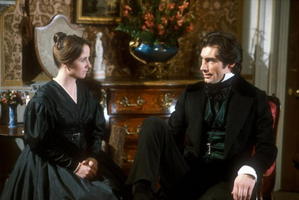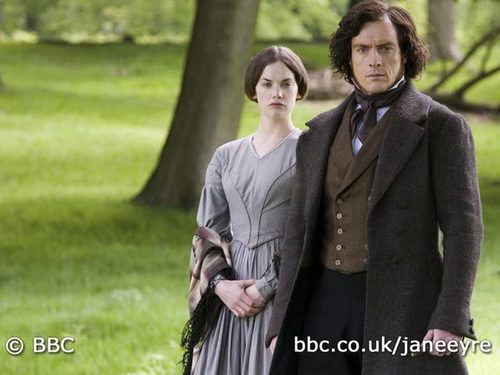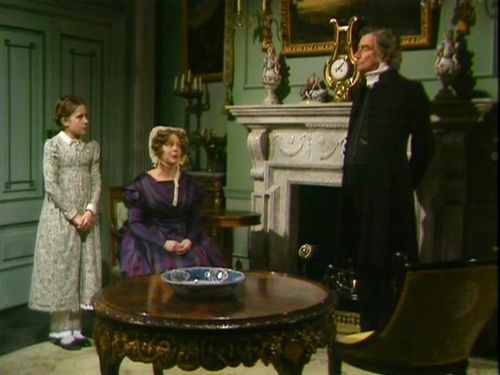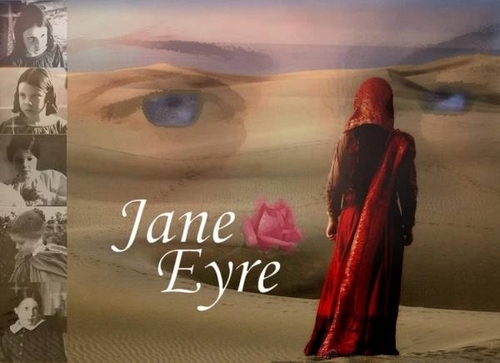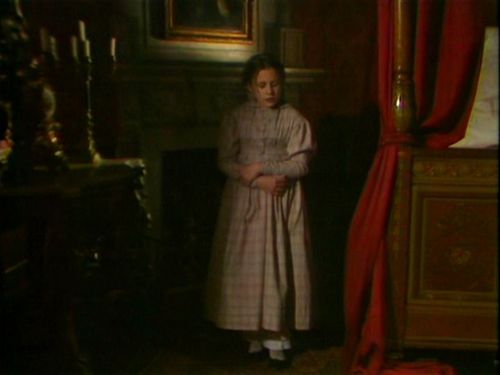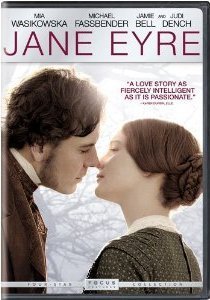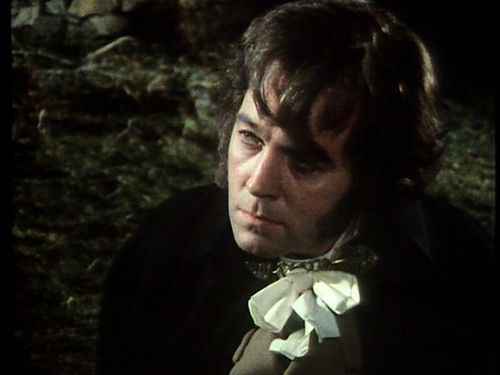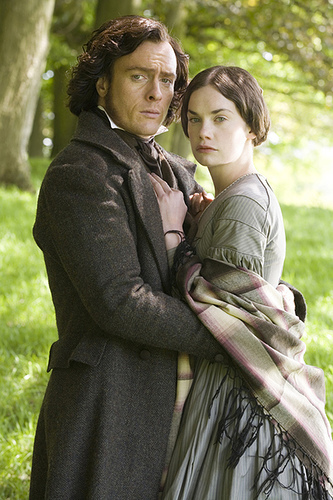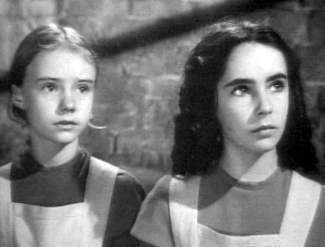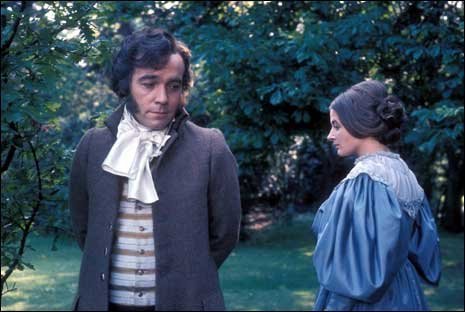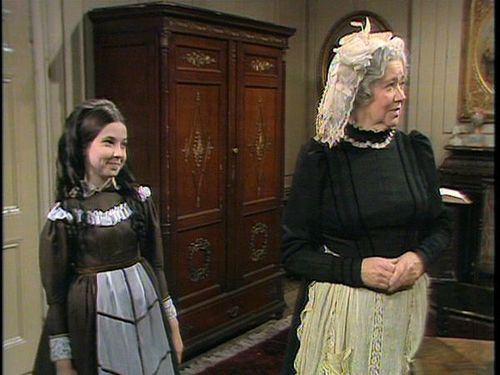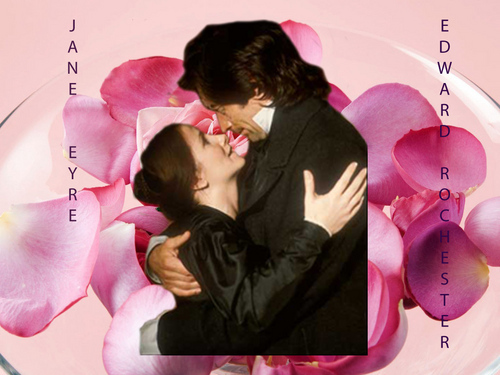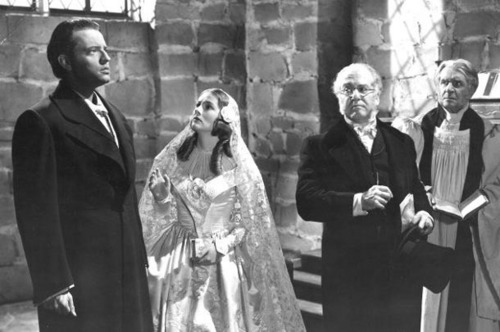"JANE EYRE" (1983) Review
As long as I can remember, both the Hollywood and British film industries have trotted out Charlotte Brontë’s 1847 novel, "Jane Eyre" in order to make a movie or television adaptation of it. Looking back, I realize that I have seen at least six adaptation of the novel in my life time.
One of those adaptations turned out to be the 1983 BBC miniseries, "JANE EYRE". Directed by Julian Amyes and adapted by Alexander Baron, the eleven-part miniseries starred Zelah Clarke in the title role and Timothy Dalton as Edward Rochester. Following Brontë’s novel, "JANE EYRE" told the story of a plain young English woman in early 19th Britain – from her abusive childhood to her position as a governess at an imposing manor in the Yorkshire countryside. Jane’s story began at Gateshead, where she suffered abuse at the hands of her widowed aunt-in-law and three cousins. After a clash with her cousin John, Mrs. Reed has Jane enrolled at Lowood Institution, a charity school for girls. Jane spends the next eight years under the tyrannical rule of Lowood’s headmaster, the self-righteous clergyman Mr. Brocklehurst – six years as a student and two as a teacher.
Longing for greener pastures, Jane advertises her services as a governess, and receives a reply from a Mrs. Alice Fairfax, housekeeper of Thornfield Hall. She takes the position and becomes governess for Adele Varens, the young French ward of Thornfield’s master, Mr. Edward Rochester. After meeting Mr. Rochester, Jane develops a close friendship with him . . . and the two eventually fall in love. But a secret involving strange laughs, a mysterious fire and an attack on Rochester's house guest, Mr. Mason threatens any chance of marital bliss for the governess and her employer.
I first saw "JANE EYRE" years ago on a video cassette copy that featured no opening or closing credits between episodes. So, it eventually came as surprise to me that the 1983 miniseries had aired in eleven thirty-minute installments. I found myself wondering why the BBC had decided to air the miniseries in this fashion. Why not air it in five one-hour episodes? Or six fifty-minutes episodes? Regardless of the manner in which the BBC had aired "JANE EYRE", I cannot deny that in the end, I found it very satisfying.
Before I wax lyrical over "JANE EYRE", I have to acknowledge some of its aspects that I found unappealing. Many fans probably loved the idea of this adaptation being so close to Brontë’s novel in compare to many other adaptations. And while I am relieved that Alexander Baron’s screenplay did not rush the story in a manner similar to the 1997 television adaptation, there were times when I found this miniseries a bit too loyal to the novel. I might as well confess that I am not particularly fond of the sequences that featured Jane’s years at Lonwood and her time spent with St. John Rivers and his two sisters. The Lowood sequences bored me senseless. I understand that Jane’s interactions with the school’s headmaster was a message on the oppression of a patriarchal society, I practically struggled to prevent myself from hitting the Fast Forward button of my remote. I could say the same about Jane’s time with the Rivers family. While I had initially found her relationship with St. John Rivers fascinating, I heaved a mighty sigh of relief by the time Jane returned to Thornfield Hall. Sometimes, a film or television production can be too faithful to a literary source . . . to the point of dragging the story’s pacing to a near halt.
I have one last complaint to reveal - namely the characterization of Edward Rochester's mysterious wife from the West Indies, Mrs. Bertha Rochester. I realize that Baron and director Julian Amyes were trying to be as faithful to the novel as possible. Unfortunately, Bertha's characterization turned out to be another example of the dangers of a movie or miniseries being too faithful to a literary source. I was surprised to experience a glimmer of sympathy toward the character, while watching the 1997 movie. I felt no such glimmer in this version . . . merely irritation. I cannot blame actress Joolia Cappleman. She must have been following the script or Amyes' direction. But for years, I have harbored the feeling that the characterization of Bertha . . . and Adele's dancer mother, for that matter, may have been examples of Brontë's xenophobia toward the French or anyone who was not British. Bertha's characterization struck me as completely one-dimensional and created in a manner to garner sympathy toward the controlling Rochester, who had just attempted to drag Jane into a bigamous marriage. Considering that the 1966 novel, "Wide Sargasso Sea" had been around for seventeen years around this time, could it have hurt both Amyes and Baron to portray Bertha in a slightly more sympathetic light?
Michael Edwards did a solid job in his production designs for "JANE EYRE". I was especially impressed by his use of Deene Park, located near Corby, Northamptonshire; for the Thornfield Hall sequences. And his recreation of the Yorkshire countryside in 1830s England during those scenes featuring Jane's attempts to find shelter and food following her from Thornfield struck me as tolerably convincing. Cinematographers David Doogood, John Kenway and Keith Salmon's photography seemed pretty solid, despite the miniseries being shot in video film. Speaking of the 1830s, I still find it surprising that this is the only adaptation of "Jane Eyre" that is set during this decade. The other five versions I have seen were all set during the early or mid 1840s. I must admit that Gill Hardie's costumes ably reflected that particular decade.
Despite my complaints, I still enjoyed "JANE EYRE" very much. Baron and Amyes did an excellent job of recapturing Brontë's saga. Their handling of Jane's romance with Rochester bridled with passion and intelligence. More importantly, they retained enough of Brontë's work to convey a very plausible development of Jane's character. Both director and screenwriter perfectly maintained Rochester's complex personality. His love for Jane and appreciation of her intelligence seemed apparent. Yet, Baron maintained a good deal of Rochester's sardonic humor and controlling nature. The meat of Brontë's novel has always been centered around Jane and Rochester's relationship. And the miniseries perfectly captured every delicious nuance of it. But I must admit that I was also impressed by the sequences featuring Jane's early years at Gateshead. Baron did a good job of capturing the miseries that Jane suffered at the hands of the Reed family. When I first saw "JANE EYRE", I had lacked the patience to appreciate the sequence in which Jane becomes a vagabond before meeting the Rivers family. This last viewing made me appreciate it, because it conveyed the suffering that Jane had endured after leaving Thornfield Hall - something that most adaptations seem to gloss over.
I cannot deny that the performances featured in "JANE EYRE" were top-notched. Both Zelah Clarke and Timothy Dalton created a strong screen chemistry as the two leads, Jane Eyre and Edward Rochester. Clarke's Jane seemed very submissive in Rochester's "commanding" presence . . . at least at first. There was an interesting scene in which Jane eagerly approached her employer, the morning following an evening of easy camaraderie between the two. Instead, Rochester responded in a brusque manner, producing a wounded puppy dog expression on Jane's face. Another scene that impressed me featured Jane's reluctant admission of her true feelings toward Rochester. The pair acted the hell out of that scene, leaving me convinced that I had witnessed their finest moment together. Some might view Rochester's failed attempt to prevent Jane's departure from Thornfield as that special moment. But the "admission of love" scene was the one that really impressed me.
Zelah Clarke did an excellent job in conveying Jane's emotional growth from a reserved and pious eighteen year-old governess to the strong-willed and more emotional woman. Her Jane Eyre struck me as slightly more reserved than other portrayals. Which seemed all the more amazing to me, as Clarke slowly revealed Jane's inner passions. Timothy Dalton gave, in my opinion, the best portrayal of the complex Edward Rochester. Mind you, he had his moments of theatricality. But in the end, Dalton superbly conveyed both the best and worst of Rochester's character with seamless skill. Some have declared Dalton as too handsome for the plain-looking Rochester. Considering that just about every actor who has portrayed the character was more attractive than the literary character. I found such arguments irrelevant.
Both Clarke and Dalton received solid support from the rest of the cast. Damien Thomas seemed very impressive as Richard Mason, Rochester's tenuously sane and nervous brother-in-law. I could also say the same about Andrew Bicknell's cool and commanding portrayal of St. John Rivers, the missionary wannabe. Blance Youinou was quite charming as Rochester's young French ward, Adele Valens. And Sian Pattenden was impressively believable as the hot-tempered young Jane Eyre.
I cannot say that "JANE EYRE" is perfect. Unlike other costume drama fans, I do not require that period movie or miniseries be an exact adaptation of its literary source. Although this adaptation of Brontë's novel might not be completely faithful, I do wish that screenwriter Alexander Baron had been even a little less faithful, especially in scenes featuring Jane's years at Lowood and her time spent with the Rivers family. But I cannot deny that this miniseries turned out to be an excellent adaptation. I would probably go so far to state that it might be the best adaptation of Brontë's novel. And we have Baron's writing, Julian Amyes' direction and superb performances from Zelah Clarke and Timothy Dalton to thank.
As long as I can remember, both the Hollywood and British film industries have trotted out Charlotte Brontë’s 1847 novel, "Jane Eyre" in order to make a movie or television adaptation of it. Looking back, I realize that I have seen at least six adaptation of the novel in my life time.
One of those adaptations turned out to be the 1983 BBC miniseries, "JANE EYRE". Directed by Julian Amyes and adapted by Alexander Baron, the eleven-part miniseries starred Zelah Clarke in the title role and Timothy Dalton as Edward Rochester. Following Brontë’s novel, "JANE EYRE" told the story of a plain young English woman in early 19th Britain – from her abusive childhood to her position as a governess at an imposing manor in the Yorkshire countryside. Jane’s story began at Gateshead, where she suffered abuse at the hands of her widowed aunt-in-law and three cousins. After a clash with her cousin John, Mrs. Reed has Jane enrolled at Lowood Institution, a charity school for girls. Jane spends the next eight years under the tyrannical rule of Lowood’s headmaster, the self-righteous clergyman Mr. Brocklehurst – six years as a student and two as a teacher.
Longing for greener pastures, Jane advertises her services as a governess, and receives a reply from a Mrs. Alice Fairfax, housekeeper of Thornfield Hall. She takes the position and becomes governess for Adele Varens, the young French ward of Thornfield’s master, Mr. Edward Rochester. After meeting Mr. Rochester, Jane develops a close friendship with him . . . and the two eventually fall in love. But a secret involving strange laughs, a mysterious fire and an attack on Rochester's house guest, Mr. Mason threatens any chance of marital bliss for the governess and her employer.
I first saw "JANE EYRE" years ago on a video cassette copy that featured no opening or closing credits between episodes. So, it eventually came as surprise to me that the 1983 miniseries had aired in eleven thirty-minute installments. I found myself wondering why the BBC had decided to air the miniseries in this fashion. Why not air it in five one-hour episodes? Or six fifty-minutes episodes? Regardless of the manner in which the BBC had aired "JANE EYRE", I cannot deny that in the end, I found it very satisfying.
Before I wax lyrical over "JANE EYRE", I have to acknowledge some of its aspects that I found unappealing. Many fans probably loved the idea of this adaptation being so close to Brontë’s novel in compare to many other adaptations. And while I am relieved that Alexander Baron’s screenplay did not rush the story in a manner similar to the 1997 television adaptation, there were times when I found this miniseries a bit too loyal to the novel. I might as well confess that I am not particularly fond of the sequences that featured Jane’s years at Lonwood and her time spent with St. John Rivers and his two sisters. The Lowood sequences bored me senseless. I understand that Jane’s interactions with the school’s headmaster was a message on the oppression of a patriarchal society, I practically struggled to prevent myself from hitting the Fast Forward button of my remote. I could say the same about Jane’s time with the Rivers family. While I had initially found her relationship with St. John Rivers fascinating, I heaved a mighty sigh of relief by the time Jane returned to Thornfield Hall. Sometimes, a film or television production can be too faithful to a literary source . . . to the point of dragging the story’s pacing to a near halt.
I have one last complaint to reveal - namely the characterization of Edward Rochester's mysterious wife from the West Indies, Mrs. Bertha Rochester. I realize that Baron and director Julian Amyes were trying to be as faithful to the novel as possible. Unfortunately, Bertha's characterization turned out to be another example of the dangers of a movie or miniseries being too faithful to a literary source. I was surprised to experience a glimmer of sympathy toward the character, while watching the 1997 movie. I felt no such glimmer in this version . . . merely irritation. I cannot blame actress Joolia Cappleman. She must have been following the script or Amyes' direction. But for years, I have harbored the feeling that the characterization of Bertha . . . and Adele's dancer mother, for that matter, may have been examples of Brontë's xenophobia toward the French or anyone who was not British. Bertha's characterization struck me as completely one-dimensional and created in a manner to garner sympathy toward the controlling Rochester, who had just attempted to drag Jane into a bigamous marriage. Considering that the 1966 novel, "Wide Sargasso Sea" had been around for seventeen years around this time, could it have hurt both Amyes and Baron to portray Bertha in a slightly more sympathetic light?
Michael Edwards did a solid job in his production designs for "JANE EYRE". I was especially impressed by his use of Deene Park, located near Corby, Northamptonshire; for the Thornfield Hall sequences. And his recreation of the Yorkshire countryside in 1830s England during those scenes featuring Jane's attempts to find shelter and food following her from Thornfield struck me as tolerably convincing. Cinematographers David Doogood, John Kenway and Keith Salmon's photography seemed pretty solid, despite the miniseries being shot in video film. Speaking of the 1830s, I still find it surprising that this is the only adaptation of "Jane Eyre" that is set during this decade. The other five versions I have seen were all set during the early or mid 1840s. I must admit that Gill Hardie's costumes ably reflected that particular decade.
Despite my complaints, I still enjoyed "JANE EYRE" very much. Baron and Amyes did an excellent job of recapturing Brontë's saga. Their handling of Jane's romance with Rochester bridled with passion and intelligence. More importantly, they retained enough of Brontë's work to convey a very plausible development of Jane's character. Both director and screenwriter perfectly maintained Rochester's complex personality. His love for Jane and appreciation of her intelligence seemed apparent. Yet, Baron maintained a good deal of Rochester's sardonic humor and controlling nature. The meat of Brontë's novel has always been centered around Jane and Rochester's relationship. And the miniseries perfectly captured every delicious nuance of it. But I must admit that I was also impressed by the sequences featuring Jane's early years at Gateshead. Baron did a good job of capturing the miseries that Jane suffered at the hands of the Reed family. When I first saw "JANE EYRE", I had lacked the patience to appreciate the sequence in which Jane becomes a vagabond before meeting the Rivers family. This last viewing made me appreciate it, because it conveyed the suffering that Jane had endured after leaving Thornfield Hall - something that most adaptations seem to gloss over.
I cannot deny that the performances featured in "JANE EYRE" were top-notched. Both Zelah Clarke and Timothy Dalton created a strong screen chemistry as the two leads, Jane Eyre and Edward Rochester. Clarke's Jane seemed very submissive in Rochester's "commanding" presence . . . at least at first. There was an interesting scene in which Jane eagerly approached her employer, the morning following an evening of easy camaraderie between the two. Instead, Rochester responded in a brusque manner, producing a wounded puppy dog expression on Jane's face. Another scene that impressed me featured Jane's reluctant admission of her true feelings toward Rochester. The pair acted the hell out of that scene, leaving me convinced that I had witnessed their finest moment together. Some might view Rochester's failed attempt to prevent Jane's departure from Thornfield as that special moment. But the "admission of love" scene was the one that really impressed me.
Zelah Clarke did an excellent job in conveying Jane's emotional growth from a reserved and pious eighteen year-old governess to the strong-willed and more emotional woman. Her Jane Eyre struck me as slightly more reserved than other portrayals. Which seemed all the more amazing to me, as Clarke slowly revealed Jane's inner passions. Timothy Dalton gave, in my opinion, the best portrayal of the complex Edward Rochester. Mind you, he had his moments of theatricality. But in the end, Dalton superbly conveyed both the best and worst of Rochester's character with seamless skill. Some have declared Dalton as too handsome for the plain-looking Rochester. Considering that just about every actor who has portrayed the character was more attractive than the literary character. I found such arguments irrelevant.
Both Clarke and Dalton received solid support from the rest of the cast. Damien Thomas seemed very impressive as Richard Mason, Rochester's tenuously sane and nervous brother-in-law. I could also say the same about Andrew Bicknell's cool and commanding portrayal of St. John Rivers, the missionary wannabe. Blance Youinou was quite charming as Rochester's young French ward, Adele Valens. And Sian Pattenden was impressively believable as the hot-tempered young Jane Eyre.
I cannot say that "JANE EYRE" is perfect. Unlike other costume drama fans, I do not require that period movie or miniseries be an exact adaptation of its literary source. Although this adaptation of Brontë's novel might not be completely faithful, I do wish that screenwriter Alexander Baron had been even a little less faithful, especially in scenes featuring Jane's years at Lowood and her time spent with the Rivers family. But I cannot deny that this miniseries turned out to be an excellent adaptation. I would probably go so far to state that it might be the best adaptation of Brontë's novel. And we have Baron's writing, Julian Amyes' direction and superb performances from Zelah Clarke and Timothy Dalton to thank.


